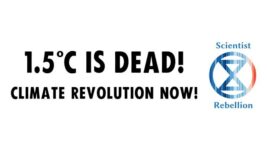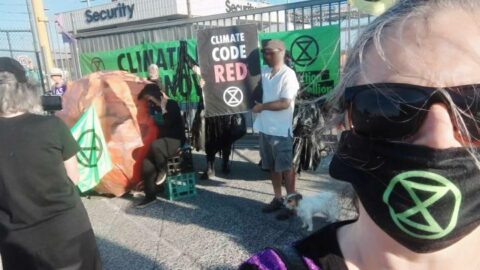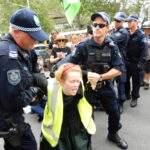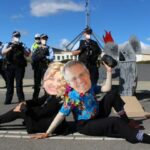Climate Revolution Now: An Interview With Scientist Rebellion’s Karin Xuereb

Back in the day, the process of disseminating the message that the climate is collapsing to the point of no return was clear. The scientists did the research, produced the evidence, and the activists held public demonstrations to raise awareness.
But with multiple ongoing extreme weather events occurring around the globe, the situation has become so desperate that scientists have now joined the ranks of agitators and are beginning to take nonviolent direct action, aiming to give a heightened authority to the on-the-street message.
Generally speaking, scientists aren’t the type of people one expects to see on the frontline of civil disobedience actions facing off against the police.
However, Scientist Rebellion is changing all that. Founded in 2020, the then small largely European group has now morphed into a broad global movement.
On 6 April this year, SR staged a worldwide day of protests with over 1,000 members of the scientific community staging nonviolent direct actions in 25 countries. And in terms of the authorities, they cracked down on these professors and researchers, just like any other climate defender.
Destroying the planet for profit
The Liberal Nationals government has played something of a charade in its close to a decade in power.
Not only did it blatantly attempt to deny climate change was happening, but when that got too difficult it simply tried to downplay the severity of the crisis to ensure fossil fuel profiteering.
But this wasn’t always the case. On the very day that then Labor leader Kevin Rudd became PM in December 2007, the Department of Climate Change was established, which had a mandate that included looking into renewable energy, greenhouse gas abatement and energy efficiency.
And when Julia Gillard took over the reins of the Labor government in 2011, the new PM established the Climate Commission, which was an independent body charged with producing information on changing climate, which was headed up by some of the most respected scientists in the field.
Then, when the Abbott government took control in September 2013, one of its first moves was to abolish the Climate Commission, and it also began gradually eroding the climate change department, so that it’s now been swallowed by the Department of Industry, Science, Energy and Resources.
Silencing the crisis
Scientist Rebellion member Karin Xuereb is well aware that the Coalition purposefully eroded and erased government research into climate. As a former Bureau of Meteorology senior meteorologist, she was involved in climate change-based research funded by the Labor government.
Today, a freelance rainfall data analyst, Xuereb recalls that once Abbott took control of the government all employees working for agencies, like BoM and the CSIRO, were ordered to no longer discuss or mention changing climate outside of the workplace.
Sydney Criminal Lawyers spoke to SR’s Karin Xuereb about why recent extreme weather events have foiled the Coalition’s attempt to hide the climate crisis, what’s driven scientists to take to the streets, and how she considers the prospect of having prisons full of climate defenders.

Karin, as a meteorologist who has a focus on rainfall, you took part in 2009 research into the likely affects that climate change was going to have on probable maximum precipitation.
At the time, the study found that one recent excessive rainfall event had already occurred. But, overall, it concluded it was likely that changing climate would affect the heaviness of rainfall into the future.
This study was commissioned by the Queensland Department of Natural Resources and Water and the Commonwealth Department of Climate Change with help from the Bureau of Meteorology.
Considering the recent mass rainfalls and flooding along the eastern seaboard, what do you think about the approach that was taken to these early warnings?
Going back to the 2009 study, it shows that at that time climate change was being taken seriously by the government. The fact that they actually committed to this report showed that.
Given the recent flooding, it would probably be appropriate to review the probable maximum precipitation information for Australia.
It would be very interesting to compare the information regarding the recent events with the historical data.
The government departments that used to investigate the dangers of the climate crisis decades ago have either since disappeared, or, like the BoM, have been co-opted into downplaying what’s going on.
Can you speak about what you witnessed occur to the priority that government was once giving to global warming and the impact this shift had?
With the change of government, there was a big shift in 2013. All work to do with climate change was stopped.
So, this impacted the Bureau of Meteorology and the CSIRO. Hundreds of climate jobs were cut at the CSIRO.
The climate research was then left up to the universities. Since that time, there hasn’t been much climate research going on at the CSIRO and certainly not at the Bureau.
There used to be some research being done at the Bureau of Meteorology, but it was mostly done at the CSIRO.
Do you think a change of government at the May election might see a reversal of this shift?
I would say it probably would, because that was such a big change as soon as the government came in.
The other thing that the government did was all of a sudden – one day to the next – we were gagged.
We were no longer able to speak to anyone about climate change – to anyone outside of work. We could talk about it amongst ourselves but not outside.
We weren’t allowed to talk about it on social media, at private gatherings or even with our families.
So, you were specifically told to stop mentioning the climate threat by your superiors?
Yes. We were given directions that we were no longer allowed to talk about it.
Southeastern Australia was severely drought stricken just a few years ago. This was followed by the megafires and now the ongoing floods.
If you watched what was happening in the northern hemisphere when we were all in lockdown last winter, the fact that the huge floods hit Australia wasn’t so surprising as it was following a general global trend. And now South Africa has just suffered the same fate.
As a meteorologist, with a keen insight into the climate crisis, how would you describe what’s happening?
With these recent events, as far as the mechanisms go, they’re not unusual. So east coast lows often cause heavy rainfalls and strong winds along the east coast.
But what we’re seeing is an increase in the intensity of the events, as well as the frequency of them.
So, when you have warmer air, there’s a greater potential for these conditions. It’s like these events are being supercharged.
So, how far down the line would you say we are into the crisis?
The signs are really scary. With the terrible droughts and the bushfires that we’ve had in Australia.
Then, in 2021, we had wildfires in many other parts of the world: Canada, the United States, Siberia, Greece and Turkey. There were floods in Canada and Europe. And now the floods are happening over here and in South Africa.
So, the signs are there and it’s just going to get worse. I mean it will get worse, even if we start doing something about it now.
It is going to get worse, before it gets better. If it gets better.

You’re a member of Scientist Rebellion, which is an offshoot of Extinction Rebellion. Where it differs is SR involves those who are actually conducting the research into the climate crisis.
What would you say it means that so many scientists have taken this step into forming a group focused on taking nonviolent direct action? And what sort of impact is it having upon onlookers to see actual respected scientists acting in this manner?
Scientists are not typically attention seekers. So, they generally like to work quietly on a research project.
To see them stepping out and taking nonviolent direct action just shows how frustrated we are at the lack of action on climate change. We’ve had to step out of our comfort zones. It’s a big thing for us.
As far as onlookers go, usually when they see Extinction Rebellion actions, we have people who support them, but there are quite a few negative reactions.
But when people see scientists taking direct actions it’s really difficult to just put it down to a bunch of hippies.
Seeing nerds taking these actions and marching in the streets shows that we are demanding that the science be taken seriously.
Recently, SR conducted a series of civil disobedience actions around the globe. What did they involve? And how were they received?
The recent actions that we did involved pasting up sections of the IPCC report in public places, occupying buildings and some people took over roads. Then there were other actions like carrying out teachings in public places.
There were quite a lot of arrests in other countries. There hasn’t been many arrests in this country yet. There was one arrest recently.
In Australia, and around the globe, authorities are starting to use more excessive force towards climate offenders and impose stricter penalties.
So, would you say in terms of the recent SR actions overseas this heightened approach was noticeable in the way authorities were reacting to scientists taking nonviolent actions?
Yes, they were. But we have been seeing this here in Australia as well with other climate groups that have ramped up their level of civil disobedience, like Fireproof Australia.
Then, we’ve had the NSW government rush in these new laws with maximum penalties of 2 years imprisonment and $22,000 fines. So, they’re really coming down hard on it.
What are your thoughts on how hard they are cracking down?
Personally, I see it as an embarrassment having activists being in gaol, alongside other people who are guilty of assault or other serious offences.
They’re just activists, and I don’t see that it compares. The penality doesn’t match the crime. To me, it is a huge overreaction.
And it could be very embarrassing if they end up having a whole lot of people in gaol for taking climate action.
And lastly, Karin, as you’ve worked for the government and seen it incrementally hiding the truth and promoting false facts about the climate, while, at the same time, it’s blatantly expanded the fossil fuel industry regardless of the evidence or the widespread outcry.
How do you see this all playing out from here? And how much time do you consider we have to turn it around before it’s too late?
Australia is captured by the fossil fuel industry, so even if we can get a change in government, I don’t really see things changing a lot, as we should really be aiming for net zero by 2030, not 2050. Twenty fifty is just way too late.
As far as how much time, Professor David King states that the next three to five years are crucial, and I agree with that.
We need to begin now, because it takes a while to really start getting the systems in place, like for energy generation and transportation.
It takes time to get these things going, so we really need to make the change immediately.







